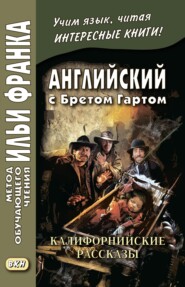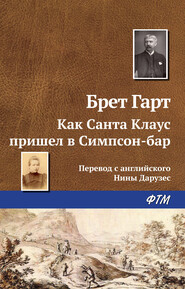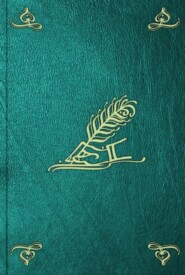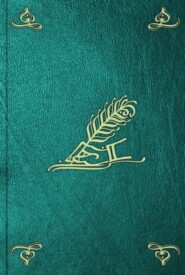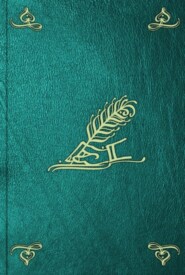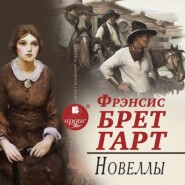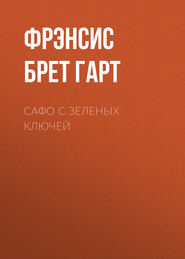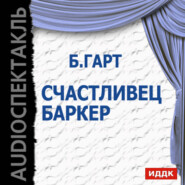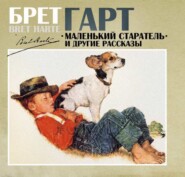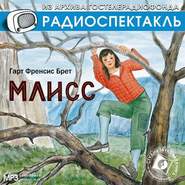По всем вопросам обращайтесь на: info@litportal.ru
(©) 2003-2024.
✖
Gabriel Conroy
Автор
Год написания книги
2017
Настройки чтения
Размер шрифта
Высота строк
Поля
The nearest were now so close upon him that he could observe them separately. They were neither large, powerful, vindictive nor ferocious. On the contrary, they were thin, wasted, haggard, anxious beasts, economically equipped and gotten up, the better to wrestle with a six months' drought, occasional famine, and the incessant buffeting of the wind – wild and untamable, but their staring eyes and nervous limbs expressed only wonder and curiosity. And when he ran toward them with a shout, they turned, as had the others, file by file, and rank by rank, and in a moment were, like the others, in full retreat. Rather, let me say, retreated as the others had retreated, for when he faced about again to retrace his steps toward the Mission, he fronted the bossy bucklers and inextricable horns of those he had driven only a few moments ago before him. They had availed themselves of his diversion with the rear-guard to return.
With the rapidity of a quick intellect and swift perceptions, Arthur saw at once the resistless logic and utter hopelessness of his situation. The inevitable culmination of all this was only a question of time – and a very brief period. Would it be sufficient to enable him to reach the casa? No! Could he regain the corral? Perhaps. Between it and himself already were a thousand cattle. Would they continue to retreat as he advanced? Possibly. But would he be overtaken meanwhile by those in his rear?
He answered the question himself by drawing from his waistcoat pocket his only weapon, a small "Derringer," and taking aim at the foremost bull. The shot took effect in the animal's shoulder, and he fell upon his knees. As Arthur had expected, his nearer comrades stopped and sniffed at their helpless companion. But, as Arthur had not expected, the eager crowd pressing behind over-bore them and their wounded brother, and in another instant the unfortunate animal was prostrate and his life beaten out by the trampling hoofs of the resistless, blind, and eager crowd that followed. With a terrible intuition that it was a foreshadowing of his own fate, Arthur turned in the direction of the corral, and ran for his very life!
As he ran he was conscious that the act precipitated the inevitable catastrophe – but he could think of nothing better. As he ran, he felt, from the shaking of the earth beneath his feet, that the act had once more put the whole herd in equally active motion behind him. As he ran, he noticed that the cattle before him retreated with something of his own precipitation. But as he ran, he thought of nothing but the awful fate that was following him, and the thought spurred him to an almost frantic effort. I have tried to make the reader understand that Arthur was quite inaccessible to any of those weaknesses which mankind regard as physical cowardice. In the defence of what he believed to be an intellectual truth, in the interests of his pride or his self-love, or in a moment of passion, he would have faced death with unbroken fortitude and calmness. But to be the victim of an accident; to be the lamentable sequel of a logical succession of chances, without motive or purpose; to be sacrificed for nothing – without proving or disproving anything; to be trampled to death by idiotic beasts, who had not even the instincts of passion or revenge to justify them; to die the death of an ignorant tramp, or any negligent clown – a death that had a ghastly ludicrousness in its method, a death that would leave his body a shapeless, indistinguishable, unrecognisable clod, which affection could not idealise nor friendship reverence, – all this brought a horror with it so keen, so exquisite, so excruciating, that the fastidious, proud, intellectual being fleeing from it might have been the veriest dastard that ever turned his back on danger. And superadded to it was a superstitious thought that for its very horror, perhaps, it was a retribution for something that he dared not contemplate!
And it was then that his strength suddenly flagged. His senses began to reel. His breath, which had kept pace with the quick beating of his heart, intermitted, hesitated, was lost! Above the advancing thunder of hoofs behind him, he thought he heard a woman's voice. He knew now he was going crazy; he shouted and fell; he rose again and staggered forward a few steps and fell again. It was over now! A sudden sense of some strange, subtle perfume, beating up through the acrid, smarting dust of the plain, that choked his mouth and blinded his eyes, came swooning over him. And then the blessed interposition of unconsciousness and peace.
He struggled back to life again with the word "Philip" in his ears, a throbbing brow, and the sensation of an effort to do something that was required of him. Of all his experience of the last few moments only the perfume remained. He was lying alone in the dry bed of the arroyo; on the bank a horse was standing, and above him bent the dark face and darker eyes of Donna Dolores.
"Try to recover sufficient strength to mount that horse," she said, after a pause.
It was a woman before him. With that innate dread which all masculine nature has of exhibiting physical weakness before a weaker sex, Arthur struggled to rise without the assistance offered by the small hand of his friend. That, however, even at that crucial moment, he so far availed himself of it, as to press it, I fear was the fact.
"You came to my assistance alone?" asked Arthur, as he struggled to his feet.
"Why not? We are equal now, Don Arturo," said Donna Dolores, with a dazzling smile. "I saw you from my window. You were rash – pardon me – foolish! The oldest vaquero never ventures a foot upon these plains. But come; you shall ride with me. There was no time to saddle another horse, and I thought you would not care to let others know of your adventure. Am I right?"
There was a slight dimple of mischief in her cheek, and a quaint sparkle in her dark eye, as she turned her questioning gaze on Arthur. He caught her hand and raised it respectfully to his lips.
"You are wise as you are brave, Donna Dolores."
"We shall see. But at present you must believe that I am right, and do as I say. Mount that horse – I will help you if you are too weak – and – leave a space for me behind you!"
Thus adjured, Arthur leaped into the saddle. If his bones had been broken instead of being bruised, he would still have found strength for that effort. In another instant Donna Dolores' little foot rested on his, and she lightly mounted behind him.
"Home now. Hasten; we will be there before any one will know it," she said, as she threw one arm around his waist, with superb unconsciousness.
Arthur lifted the rein and dropped his heels into the flanks of the horse. In five minutes – the briefest, as it seemed to him, he had ever passed – they were once more within the walls of the Blessed Trinity.
BOOK IV.
DRIFTING
CHAPTER I.
MR. AND MRS. CONROY AT HOME
The manner in which One Horse Gulch received the news of Gabriel Conroy's marriage was characteristic of that frank and outspoken community. Without entering upon the question of his previous shameless flirtation with Mrs. Markle – the baleful extent of which was generally unknown to the camp – the nearer objections were based upon the fact that the bride was a stranger and consequently an object of suspicion, and that Gabriel's sphere of usefulness in a public philanthropic capacity would be seriously impaired and limited. His very brief courtship did not excite any surprise in a climate where the harvest so promptly followed the sowing, and the fact, now generally known, that it was he who saved the woman's life after the breaking of the dam at Black Cañon, was accepted as a sufficient reason for his success in that courtship. It may be remarked here that a certain grim disbelief in feminine coyness obtained at One Horse Gulch. That the conditions of life there were as near the perfect and original condition of mankind as could be found anywhere, and that the hollow shams of society and weak artifices of conventionalism could not exist in that sincere atmosphere, were two beliefs that One Horse Gulch never doubted.
Possibly there was also some little envy of Gabriel's success, an envy not based upon any evidence of his superior courage, skill, or strength, but only of the peculiar "luck," opportunity, or providence, that had enabled him to turn certain qualities very common to One Horse Gulch to such favourable account.
"Toe think," said Jo. Briggs, "thet I was allowin' – only thet very afternoon – to go up that cañon arter game, and didn't go from some derned foolishness or other, and yer's Gabe, hevin' no call to go thar, jest comes along, accidental like, and, dern my skin! but he strikes onto a purty gal and a wife the first lick!"
"Thet's so," responded Barker, "it's all luck. Thar's thet Cy. Dudley, with plenty o' money and wantin' a wife bad, and ez is goin' to Sacramento to-morrow to prospect fur one, and he hez been up and down that cañon time outer mind, and no dam ever said 'break' to him! No, sir! Or take my own case; on'y last week when the Fiddletown coach went over the bank at Dry Creek, wasn't I the fust man thar ez cut the leaders adrift and bruk open the coach-door and helped out the passengers? And wot passengers? Six Chinymen by Jinks – and a Greaser! Thet's my luck."
There were few preliminaries to the marriage. The consent of Olly was easily gained. As an act of aggression and provocation towards Mrs. Markle, nothing could offer greater inducements. The superior gentility of the stranger, the fact of her being a stranger, and the expeditiousness of the courtship coming so hard upon Mrs. Markle's fickleness commended itself to the child's sense of justice and feminine retaliation. For herself, Olly hardly knew if she liked her prospective sister; she was gentle, she was kind, she seemed to love Gabriel – but Olly was often haunted by a vague instinct that Mrs. Markle would have been a better match – and with true feminine inconsistency she hated her the more for it. Possibly she tasted also something of the disappointment of the baffled match-maker in the depths of her childish consciousness.
It may be fairly presumed that the former Mrs. Devarges had confided to no one but her lawyer the secret of her assumption of the character of Grace Conroy. How far or how much more she had confided to that gentleman was known only to himself; he kept her secret, whatever might have been its extent, and received the announcement of her intended marriage to Gabriel with the superior smile of one to whom all things are possible from the unprofessional sex.
"Now that you are about to enter into actual possession," said Mr. Maxwell, quietly buttoning up his pocket again, "I suppose you will not require my services immediately."
It is said, upon what authority I know not, that Madame Devarges blushed slightly, heaved the least possible sigh as she shook her head and said, "I hope not," with an evident sincerity that left her legal adviser in some slight astonishment.
How far her intended husband participated in this confidence I do not know. He was evidently proud of alluding to her in the few brief days of his courtship as the widow of the "great Doctor Devarges," and his knowledge of her former husband to some extent mitigated in the public mind the apparent want of premeditation in the courtship.
"To think of the artfulness of that man," said Sal, confidentially, to Mrs. Markle, "and he a-gettin' up sympathy about his sufferin's at Starvation Camp, and all the while a-carryin' on with the widder of one o' them onfortunets. No wonder that man was queer! Wot you allowed in the innocents o' yer heart was bashfulness was jest conscience. I never let on to ye, Mrs. Markle, but I allus noticed thet thet Gabe never could meet my eye."
The flippant mind might have suggested that as both of Miss Sarah's eyes were afflicted with a cast, there might have been a physical impediment to this exchange of frankness, but then the flippant mind never enjoyed the confidence of this powerful young woman.
It was a month after the wedding, and Mrs. Markle was sitting alone in her parlour, whither she had retired after the professional duties of supper were over, when the front door opened, and Sal entered. It was Sunday evening, and Sal had been enjoying the brief recreation of gossip with the neighbours, and, as was alleged by the flippant mind before alluded to, some coquettish conversation and dalliance with certain youth of One Horse Gulch.
Mrs. Markle watched her handmaid slowly remove an immense straw "flat" trimmed with tropical flowers, and then proceed to fold away an enormous plaid shawl which represented quite another zone, and then her curiosity got the better of her prudence.
"Well, and how did ye find the young couple gettin' on, Sal?"
Sal too well understood the value of coyly-withheld information to answer at once, and with the instincts of a true artist, she affected to misunderstand her mistress. When Mrs. Markle had repeated her question Sal replied, with a a sarcastic laugh —
"Axin yer pardin fur manners, but you let on about the young couple, and she forty if she's anythin'."
"Oh, no, Sal," remonstrated Mrs. Markle, with reproachful accents, and yet a certain self-satisfaction; "you're mistaken, sure."
"Well," said Sal, breathlessly slapping her hands on her lap, "if pearl powder and another woman's har and fancy doin's beggiles folks, it ain't Sal ez is among the folks fooled. No, Sue Markle. Ef I ain't lived long enough with a woman ez owns to thirty-three and hez – ef it wuz my last words and God is my jedge – the neck and arms of a gal of sixteen, not to know when a woman is trying to warm over the scraps of forty year with a kind o' hash o' twenty, then Sal Clark ain't got no eyes, thet's all."
Mrs. Markle blushed slightly under the direct flattery of Sal, and continued —
"Some folks says she's purty."
"Some men's meat is other men's pizen," responded Sal, sententiously, unfastening an enormous black velvet zone, and apparently permitting her figure to fall into instant ruin.
"How did they look?" said Mrs. Markle, after a pause, recommencing her darning, which she had put down.
"Well, purty much as I allowed they would from the first. Thar ain't any love wasted over thar. My opinion is thet he's sick of his bargin. She runs the house and ev'ry thing that's in it. Jest look at the critter! She's just put that thar Gabe up to prospecting all along the ledge here, and that fool's left his diggin's and hez been running hither and yon, making ridiklus holes all over the hill jest to satisfy thet woman, and she ain't satisfied neither. Take my word for it, Sue Markle, thar's suthin' wrong thar. And then thar's thet Olly" —
Mrs. Markle raised her eyes quickly, and put down her work. "Olly," she repeated, with great animation – "poor little Olly! what's gone of her?"
"Well," said Sal, with an impatient toss of her head, "I never did see what thar wuz in that peart and sassy piece for any one to take to – leastwise a woman with a child of her own. The airs and graces thet thet Olly would put on wuz too much. Why, she hedn't been nigh us for a month, and the day afore the wedding what does that limb do but meet me and sez, sez she, 'Sal, ye kin tell Mrs. Markle as my brother Gabe ez goin' to marry a lady – a lady,' sez she. 'Thar ain't goin' to be enny Pikes about our cabin.' And thet child only eight years! Oh, git out thar! I ain't no patience!"
To the infinite credit of a much abused sex, be it recorded that Mrs. Markle overlooked the implied slur, and asked —
"But what about Olly?"
"I mean to say," said Sal, "thet thet child hain't no place in thet house, and thet Gabe is jest thet weak and mean spirited ez to let thet woman have her own way. No wonder thet the child was crying when I met her out in the woods yonder."
Mrs. Markle instantly flushed, and her black eyes snapped ominously. "I should jest like to ketch – " she began quickly, and then stopped and looked at her companion. "Sal," she said, with swift vehemence, "I must see thet child."
"How?"







